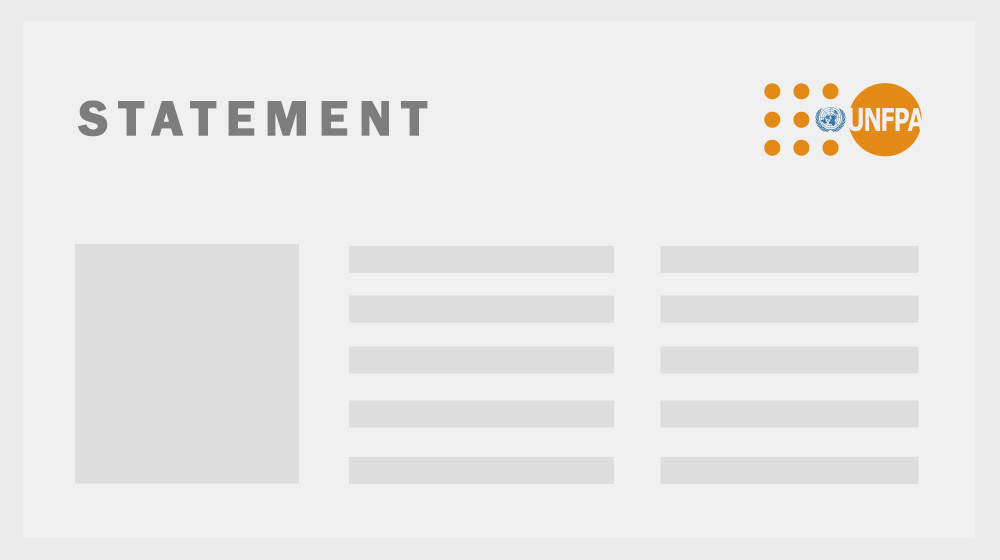The Executive Director’s IASC Championship on Protection from Sexual Exploitation and Abuse and Sexual Harassment
In January 2021, UNFPA Executive Director Dr. Natalia Kanem assumed the Inter-Agency Standing Committee (IASC) Championship on Protection from Sexual Exploitation and Abuse and Sexual Harassment (PSEAH).
The IASC is the longest-standing and highest-level humanitarian coordination forum of the United Nations system. It gathers together 18 Principals of United Nations and non-United Nations entities to ensure cohesive and timely international response to humanitarian crises.
In May 2018, the IASC outlined its vision of a humanitarian environment where people in crises can access protection and assistance without fear of exploitation or abuse by any aid worker. (Read the Chair's statement.) In their PSEAH Strategy and related Acceleration Plan, IASC Champions set key objectives and priorities to address sexual exploitation and abuse and sexual harassment.
To further these objectives and build on the work of previous Champions, UNFPA focused on strengthening a victim-centered approach to preventing and addressing sexual wrongdoing. Dr. Kanem identified three core priorities at the heart of her championship and five key initiatives to drive them forward. During her championship, UNFPA made progress in furthering those initiatives.
Watch the video statement by UNFPA Executive Director Dr. Natalia Kanem
The Executive Director's three priorities
1. Bolster PSEA country mechanisms
Leadership, accountability and coordination are fundamental in order to prevent and respond to sexual exploitation and abuse on the ground. Inter-agency PSEA networks, led by dedicated inter-agency coordinators, have proven to be effective mechanisms to champion efforts to address SEA in-country.
2. Ensure access to quality information and assistance
Humanitarian actors have a fundamental responsibility to ensure victims of SEA have access to timely, quality and survivor-centred assistance offered through specialized gender-based violence (GBV) support services. GBV case management services constitute a critical and life-saving primary entry point for survivors of GBV, including SEA, to receive immediate and longer-term support. This requires sustained investment in assistance to ensure that services meet the unique needs of survivors of GBV, including SEA, on the ground.
3. Strengthen coordination and coherence
Inter-agency cooperation forms the backbone of all PSEAH work. An effective and structured response must bring together a range of actors from within and outside the United Nations system, including civil society, affected communities and governments. It is critical that these groups are at the table in order to promote a truly victim-centred approach to PSEAH.
Let’s all be champions of protection and place the rights and dignity of victims and survivors at the heart of our efforts. — Dr. Natalia Kanem, UNFPA Executive Director
Key initiatives
Progress on the five initiatives underpinning the championship:
1. Establishment of an inter-agency PSEAH expert roster to ensure rapid deployment of qualified human resources.
Update: A roster was finalized of trained and vetted inter-agency PSEA Coordinators to ensure rapid deployment of qualified personnel. Coordinators were deployed to five IASC priority countries in 2021.
2. Review of the IASC PSEAH approach to assess the impact and effectiveness of measures implemented over the past years.
Update: An external review was undertaken to provide an independent assessment of the IASC’s collective progress on PSEAH over the past decade. The review report was submitted to IASC Principals in November 2021. The review detailed positive developments, including a constant and consistent commitment from IASC Principals on protection from sexual exploitation, abuse and harassment. The review also found several critical issues to be collectively addressed as a priority moving forward.
The report on the open session of the High-level roundtable discussion can be accessed here.
3. Development of a PSEAH training package for GBV practitioners to address the particular needs of victims of SEA.
Update: Informed by consultations with PSEAH and GBV experts in 23 countries, a three-day workshop was conducted in September 2021 and a training module was developed on GBV case management for SEA survivors for integration into the interagency GBV case management training course.
4. Dedicated consultations with United Nations and non-United Nations actors to strengthen cohesion and coordination in the response to PSEAH.
Update: A Principal-level roundtable discussion involving the United Nations, civil society and Member States was held in November 2021 to consider the review recommendations and commit to a pragmatic programme of action.
5. Advocacy campaign to improve access to quality information and assistance.
Update: The Advocacy Campaign, undertaken by the 35 IASC priority countries with partners, has been successful with over 80 dedicated United Nations Country Team/Humanitarian Country Team PSEAH meetings held, over 18,000 community conversations and 1.7 million people reached with information.
Updated 24 January 2022


